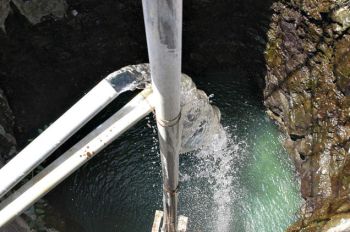Karnataka
Rainwater harvesting in urban areas of Karnataka (Government of Karnataka) - Draft policy (2006)
Posted on 18 Jun, 2011 10:16 PMThe Rainwater Harvesting Policy (2006) for Karnataka state has evolved out of the need for conserving rainwater and providing facilities for rainwater harvesting, in the context of the growing rate of urbanisation in the state and the rapid depletion of groundwater resources, leading to a water crisis.
The objective of the urban rainwater harvesting policy is to ensure that the available water is put to best possible use in the state by encouraging involvement of multiple level of stakeholders such as government and private institutions as well as citizens, in the appropriate management of rainwater.
The Karnataka Muncipal Corporation Act (1976)
Posted on 18 Jun, 2011 05:08 PMThe document describes the details of the Karnataka Municipal Corporations Act and includes:
- The short title, extent and commencement
- Definitions
- Details of the establishment of the corporation
- Municipal authorities
- Elections
- Powers and functions of the corporation and other authorities
- Proceedure of corporation and committees
The Karnataka groundwater (regulation and control of development and management) bill (2009)
Posted on 18 Jun, 2011 04:09 PMThis document from the Department of Mines and Geology, Government of Karnataka site is a bill to regulate, and control the development and management of groundwater and matters connected therewith. The document is divided into the following chapters:
Managing shallow aquifers in a city
Posted on 16 Jun, 2011 06:04 PM Good option: The city needs multiple sourcing of water and open wells have the potential to provide up to a third of the requirement
Good option: The city needs multiple sourcing of water and open wells have the potential to provide up to a third of the requirement
Just how a city can be arbitrary with its policy on water management and therefore leading to sub-optimal conditions is made clear by a recent example one came across. Balasubramanian had an old open well dug to a depth of 30 ft. when he first built his house in the early 80s. The well had yielded water for quite some years but then subsequently had gone dry.
Water Stories by talking history' - A series of films capturing water practices and rituals in Bangalore
Posted on 14 Jun, 2011 02:42 PMTalking History is an inter-collegiate course on Oral History offered at the Srishti School of Art, Design and Technology in Bangalore, India. The films were made between February - March 2011.
Doddabommasandra lake
Doddabommasandra lake is located close to B.E.L circle in an area called Doddabommasandra in Bangalore. This film endeavours to portray the story and memories of drying up of Doddabommasandra through two different viewpoints. The story reflects the pattern in which we are exploiting and losing our water resources.
A short film by Gautam Vishwanath and Kinshuk Surjan
‘Public spending and its effectiveness: Selected studies from Karnataka’ - One day seminar on health, education, water and local self-government, CBPS, 25th June, 2011, Bangalore
Posted on 13 Jun, 2011 02:09 PM Organizer: Centre for Budget and Policy Studies (CBPS)
Organizer: Centre for Budget and Policy Studies (CBPS)
Venue: White House, The Hotel Capitol, Raj bhavan Road, Bangalore
Topics:
- Health
- Education
- Drinking water
- Decentralisation
Using the metro lines in Bangalore for rainwater harvesting - Article by S Vishwanath
Posted on 27 May, 2011 12:29 PMAs the elevated tracks come up over the city a mass transport network called the metro is being built all over the city. In phases it is likely to cover over a 100 kilometre and become one of the prime modes of transport to the city. Apart from the transport benefits it will bring to the city there is one other potential benefit that could accrue to the city due to its construction.
The metro rail track offers a tremendous potential for rainwater harvesting. A total length of about 45 kilometres and a width of about 12 metres mean that the endowment of rainwater on the relatively very clean track with Bangalore’s rains of 970 mm annually is about 523 million litres. Considering a coefficient of runoff of 0.90 the harvestable rainwater is around 471 million litres annually. This could provide about 13,000 people with their annual requirement of water at 100 litres per day. A substantial sum.
Exhibition of "Dakshina Pinakini River Mapping and Landscape Survey"- An artistic intervention, 23rd - 26th May, 2011, Bengaluru
Posted on 26 May, 2011 01:23 PMVenue: Venkatappa Art Gallery, Kasthurba road, Bengaluru
Collaborated by: Subramani J, Ravikumar S M Halli & Shivaprasad S
Description:
The study focuses on Bangalore, highlighting its important rivers, lakes and its very lavish natural resources and how it is getting damaged due to its excessive urban growth and ignorance of the people. We started our documentation from Nandi hills to Hosur was our destination. Here we filmed and photographed various aspects of this river, the agricultural landscape and the urban scape. These documentations are archival materials, which have been focused during the process of research. Like how the death of a river takes place, where it used to begin and rebirth of the river due to the excess development of Broad Bangalore’s urban area.
Short course on Re-Imagining the 'World-Class' city, Indian Institute for Human Settlement, 14th - 18th June, 2011, Bangalore
Posted on 25 May, 2011 03:44 PM Organizer: Indian Institute for Human Settlement (IIHS)
Organizer: Indian Institute for Human Settlement (IIHS)
Venue: Bangalore
The 6th round New India fellowship – The New India Foundation – Apply by 31st July, 2011
Posted on 24 May, 2011 01:02 PMThe New India Foundation, based in Bangalore, uniquely matches public-spirited philanthropy with ground-breaking and relevant scholarship. In the six decades since Independence, there has been a large body of work produced by Indian historians and social scientists.
The core activities of the New India Foundation are the New India Fellowships, awarded to scholars and writers working on different aspects of the history of independent India. The duration of the fellowships is twelve months. Each year, mixes of young and experienced candidates are selected.